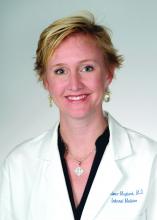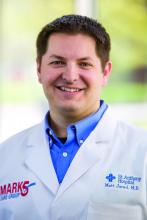User login
In January 2017, the U.S. Centers for Medicare & Medicaid Services honored SHM for its hospital patient safety and quality improvement efforts. A big reason for the plaudits was the society’s successful program and implementation toolkit called Reducing Adverse Drug Events related to Opioids (RADEO), now in its second phase.
Kevin Vuernick, senior project manager of SHM’s Center for Hospital Innovation and Improvement, says that the freely available RADEO guide explains how to develop and carry out quality improvement projects related to inpatient opioid prescribing. One of the first steps was devising interventions that hospitalists could implement to reduce opioid-related adverse events. An independent evaluator will help analyze the program’s data, best practices, and outcomes.
Keri Holmes-Maybank, MD, MSCR, FHM, an academic hospitalist at the Medical University of South Carolina, Charleston, said that the RADEO guide has a been a “phenomenal” resource. Dr. Holmes-Maybank, who led her medical center’s involvement in RADEO’s first round, says the guide helped her identify areas that her institution could work on. For one project, the medical university implemented the Pasero Opioid-Induced Sedation Scale to help prevent adverse opioid-related events, such as life-threatening respiratory depression. For a second project, the center combined existing discharge information into a more complete document that could be given to patients to educate them and their caregivers better.
St. Anthony Hospital in Oklahoma City first used RADEO to revisit how it was evaluating patients’ pain and then widened the scope to reassess how it was managing its opioid treatment and narcotic use. “We just kept swinging at the tree, trying to hit the low-hanging fruit and seeing what we could improve upon,” said Matthew Jared, MD, a hospitalist at St. Anthony and its program lead during its involvement in phase one of RADEO.
Dr. Jared is hoping to build on the momentum with a plan to develop better in-house protocols for monitoring pain, employing alternative treatments, and establishing clear lines of communication. “That’s our next step forward: really taking what we’ve learned and beginning to implement it into a holistic type of pain management within the hospital that each physician can tailor to the individual patient but still have the framework to support them,” he said. This ambitious plan is precisely the goal of RADEO, Mr. Vuernick said: providing the catalyst for change not just for hospital medicine but also for entire institutions.
In January 2017, the U.S. Centers for Medicare & Medicaid Services honored SHM for its hospital patient safety and quality improvement efforts. A big reason for the plaudits was the society’s successful program and implementation toolkit called Reducing Adverse Drug Events related to Opioids (RADEO), now in its second phase.
Kevin Vuernick, senior project manager of SHM’s Center for Hospital Innovation and Improvement, says that the freely available RADEO guide explains how to develop and carry out quality improvement projects related to inpatient opioid prescribing. One of the first steps was devising interventions that hospitalists could implement to reduce opioid-related adverse events. An independent evaluator will help analyze the program’s data, best practices, and outcomes.
Keri Holmes-Maybank, MD, MSCR, FHM, an academic hospitalist at the Medical University of South Carolina, Charleston, said that the RADEO guide has a been a “phenomenal” resource. Dr. Holmes-Maybank, who led her medical center’s involvement in RADEO’s first round, says the guide helped her identify areas that her institution could work on. For one project, the medical university implemented the Pasero Opioid-Induced Sedation Scale to help prevent adverse opioid-related events, such as life-threatening respiratory depression. For a second project, the center combined existing discharge information into a more complete document that could be given to patients to educate them and their caregivers better.
St. Anthony Hospital in Oklahoma City first used RADEO to revisit how it was evaluating patients’ pain and then widened the scope to reassess how it was managing its opioid treatment and narcotic use. “We just kept swinging at the tree, trying to hit the low-hanging fruit and seeing what we could improve upon,” said Matthew Jared, MD, a hospitalist at St. Anthony and its program lead during its involvement in phase one of RADEO.
Dr. Jared is hoping to build on the momentum with a plan to develop better in-house protocols for monitoring pain, employing alternative treatments, and establishing clear lines of communication. “That’s our next step forward: really taking what we’ve learned and beginning to implement it into a holistic type of pain management within the hospital that each physician can tailor to the individual patient but still have the framework to support them,” he said. This ambitious plan is precisely the goal of RADEO, Mr. Vuernick said: providing the catalyst for change not just for hospital medicine but also for entire institutions.
In January 2017, the U.S. Centers for Medicare & Medicaid Services honored SHM for its hospital patient safety and quality improvement efforts. A big reason for the plaudits was the society’s successful program and implementation toolkit called Reducing Adverse Drug Events related to Opioids (RADEO), now in its second phase.
Kevin Vuernick, senior project manager of SHM’s Center for Hospital Innovation and Improvement, says that the freely available RADEO guide explains how to develop and carry out quality improvement projects related to inpatient opioid prescribing. One of the first steps was devising interventions that hospitalists could implement to reduce opioid-related adverse events. An independent evaluator will help analyze the program’s data, best practices, and outcomes.
Keri Holmes-Maybank, MD, MSCR, FHM, an academic hospitalist at the Medical University of South Carolina, Charleston, said that the RADEO guide has a been a “phenomenal” resource. Dr. Holmes-Maybank, who led her medical center’s involvement in RADEO’s first round, says the guide helped her identify areas that her institution could work on. For one project, the medical university implemented the Pasero Opioid-Induced Sedation Scale to help prevent adverse opioid-related events, such as life-threatening respiratory depression. For a second project, the center combined existing discharge information into a more complete document that could be given to patients to educate them and their caregivers better.
St. Anthony Hospital in Oklahoma City first used RADEO to revisit how it was evaluating patients’ pain and then widened the scope to reassess how it was managing its opioid treatment and narcotic use. “We just kept swinging at the tree, trying to hit the low-hanging fruit and seeing what we could improve upon,” said Matthew Jared, MD, a hospitalist at St. Anthony and its program lead during its involvement in phase one of RADEO.
Dr. Jared is hoping to build on the momentum with a plan to develop better in-house protocols for monitoring pain, employing alternative treatments, and establishing clear lines of communication. “That’s our next step forward: really taking what we’ve learned and beginning to implement it into a holistic type of pain management within the hospital that each physician can tailor to the individual patient but still have the framework to support them,” he said. This ambitious plan is precisely the goal of RADEO, Mr. Vuernick said: providing the catalyst for change not just for hospital medicine but also for entire institutions.



